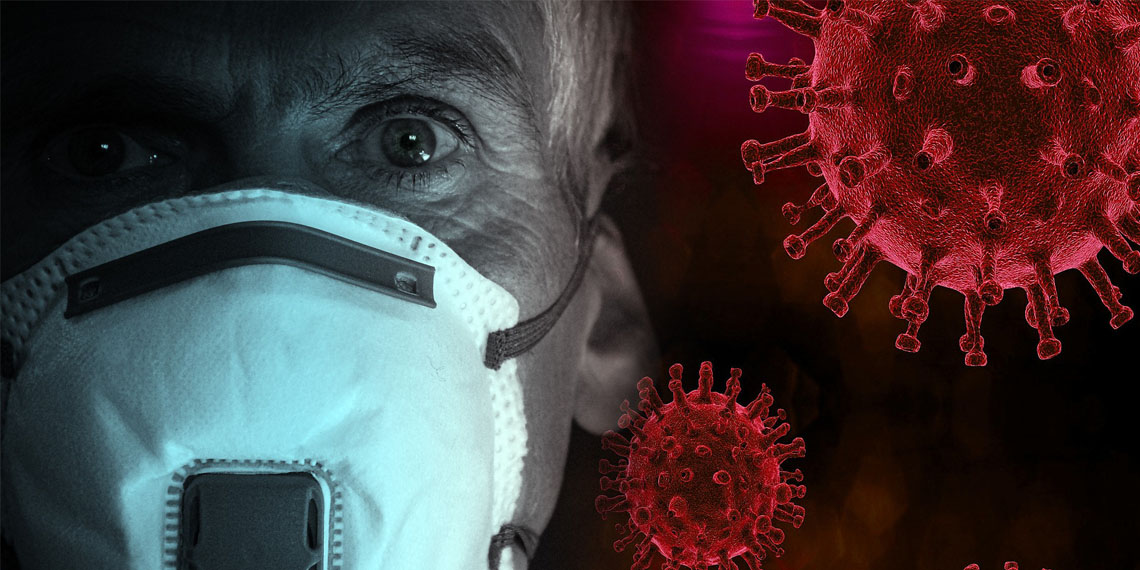A recent study published in Scientific Reports has shed light on how different forms of narcissism influenced people’s thoughts and behaviors during the COVID-19 pandemic. The researchers found that distinct types of narcissism led to both antisocial and prosocial responses.
Narcissism, a personality trait characterized by an inflated sense of self-importance and a deep need for admiration, can manifest in various forms. These forms often include behaviors and thoughts that reflect either self-enhancement (boosting one’s ego by appearing admirable) or self-protection (defending one’s ego by putting others down).
Previous studies focused mainly on a single, broad concept of narcissism, especially in relation to antisocial behaviors, such as ignoring public health guidelines or hoarding supplies. However, the researchers believed that this view was too simplistic. They wanted to explore whether different types of narcissism—some more communal and prosocial—would lead to varying pandemic-related behaviors and beliefs.
“People assume that narcissists are selfish and disobedient, but we focus on a specific type of narcissists (communal) who claim that they are exceptionally kind, helpful, and moral,” said study author Magdalena Żemojtel-Piotrowska, a professor and head of the Cross-Cultural Psychology Centre at the Cardinal Stefan Wyszynski University and president of the European Association of Psychological Assessment.
“Our team is testing a model (narcissistic sanctity and heroism) in which we try to explain how communal narcissists self-enhance and self-protect. The pandemic created a natural experiment-like opportunity to check how narcissists react to a global crisis. Given that the pandemic was an unusual social problem, we could check whether communal narcissists, who claim that they are helpful and moral, would react similarly (that is, in selfish and antagonistic ways) or differently (that is, showing exceptional prosociality and obedience in following national restrictions) compared to agentic narcissists.”
The researchers conducted their study by collecting data from over 15,000 participants from 61 countries between April and November 2020. Participants were recruited through email and social media platforms, and they filled out online surveys. These surveys assessed the participants’ levels of narcissism and their pandemic-related beliefs and behaviors.
To measure narcissism, the researchers used four distinct forms of grandiose narcissism: admiration, rivalry, sanctity, and heroism. Each form reflected different motivations and domains in which individuals sought to boost or protect their egos. Admiration and rivalry are associated with agentic domains—those related to power, competition, and achievement. Admiration reflects self-enhancement, where individuals strive to be seen as highly competent, while rivalry reflects self-protection, where individuals seek to put others down to maintain their own superiority.
Sanctity and heroism, on the other hand, are associated with communal domains involving cooperation, morality, and social responsibility. Sanctity represents self-enhancement through moral superiority, while heroism involves self-protection through crisis-related thoughts and actions, such as the belief that “only I can save us.”
The participants’ beliefs about COVID-19 were measured by assessing their endorsement of both conspiracy theories (e.g., that the virus was a bioweapon) and unfounded health beliefs (e.g., that eating garlic could cure COVID-19). The researchers also examined behaviors such as pandemic prevention (e.g., washing hands), hoarding supplies, and providing emotional support to others.
The researchers found that individuals high in rivalry and heroism narcissism were more likely to endorse conspiracy theories. These forms of narcissism are driven by self-protection, where individuals react to perceived threats by deflecting blame onto others or seeking to assert their superiority. On the other hand, admiration and sanctity narcissism, which are driven by self-enhancement, did not show a strong link to conspiracy beliefs.
When it came to unfounded health beliefs, the results were mixed. Heroism, admiration, and rivalry narcissism were associated with a greater likelihood of believing in false health claims about COVID-19. However, sanctity narcissism had the opposite effect—individuals high in sanctity were less likely to endorse these beliefs. This suggests that while some forms of narcissism may lead individuals to seek out extraordinary or false explanations, others, like sanctity narcissism, may promote more grounded and prosocial beliefs.
The study also looked at how narcissism influenced pandemic-related behaviors. Narcissistic rivalry was linked to lower adherence to prevention measures, such as handwashing and mask-wearing, reflecting a disregard for collective safety. Conversely, those high in sanctity narcissism were more likely to follow these guidelines, suggesting that their sense of moral superiority drove them to act in socially responsible ways.
When it came to hoarding behaviors, only heroism narcissism stood out. People high in this form of narcissism were more likely to stockpile goods during the pandemic. This reflects the self-protective nature of heroism narcissism, where individuals believe that they alone can manage crises and, therefore, take excessive actions to protect themselves.
Interestingly, all four forms of narcissism were linked to prosocial behavior in the form of providing emotional support to others. However, the motivations behind this behavior differed. Individuals high in sanctity, heroism, and admiration narcissism were more likely to help others, likely because doing so allowed them to boost their own sense of importance or competence. In contrast, those high in rivalry narcissism were less likely to provide emotional support, reflecting their antisocial orientation.
“We have found that narcissistic people react quite similarly across different cultural contexts—so human nature is quite universal, and we could find narcissistic behaviors everywhere,” Żemojtel-Piotrowska told PsyPost. “A quite optimistic finding is that narcissists could be prosocial and obedient if they believe that by doing so, they could get praise.”
“Our study was about differences between communal and agentic narcissists, and about different ways of self-enhancement: as effective and smart (agentic narcissists) or kind and moral (communal narcissists) and self-protection: by derogating others (agentic narcissists) or by ‘saving’ others (communal narcissists). Communal narcissists claimed more helping others and following national restrictions, but also, they believed in conspiracy theories and were ready to engage in hoarding, so despite being better at hiding their narcissistic nature, they still are narcissistic people.”
While this study offers important insights into the relationship between narcissism and pandemic responses, there are some limitations to consider. First, the study relied on self-reported data, which can be influenced by biases. For example, individuals high in communal narcissism, such as sanctity, may overstate their prosocial behaviors to appear more morally superior.
Additionally, the data were collected online, which may have excluded people without internet access or those from lower socioeconomic backgrounds, potentially limiting the generalizability of the findings.
“Especially during the pandemic, many teams ran cross-cultural studies, relying on convenience samples,” Żemojtel-Piotrowska said. “Participants of our study were burdened by many competitive projects, so it was a challenge to recruit people in the countries where typically we have no problems with finding participants (like in the United States).”
“Most of our participants were well-educated young people who were interested in responding and had access to the internet (not obvious in less affluent countries). So, self-selection bias of every sort is strongly pronounced here. Additionally, as with each such study, it is only about declarations, not true behaviors. Communal narcissists tend to show off on their prosociality and responsibility. So, we at least know that they claim that they are more prosocial, but still, we are not sure if they truly are.”
Nevertheless, the findings provide evidence that narcissism is a more complex trait than often assumed, with some forms leading to selfish behaviors and others promoting prosocial actions. Moving forward, understanding how different forms of narcissism influence behaviors in other global crises could provide a clearer picture of their broader societal impacts.
“We introduce a new model of communal narcissism, breaking it into self-enhancing (that is, sanctity) and self-protecting (that is, heroism) parts,” Żemojtel-Piotrowska added. “In our research, we want to indicate that communal narcissists react differently than agentic narcissists, as they are interested not only in showing that they are kind and moral, but also they defend themselves using different methods (they cannot be antagonistic, so instead they show their importance in the communal domain by ‘saving’ others). This project’s findings fit nicely with this story (as heroism was related to problematic beliefs and behaviors more than sanctity).”
“This paper is a one of the series from our project, the next one will be on collective narcissism, where we again look at a difference between agentic and communal narcissism, this time on collective level. A sanctity-heroism project is also developing. We encourage people to read more on our preprint on attitudes to war and peace.”
The study, “Grandiose narcissism, unfounded beliefs, and behavioral reactions during the COVID-19 pandemic,” was authored by Magdalena Żemojtel-Piotrowska, Artur Sawicki, Jarosław Piotrowski, Uri Lifshin, Mabelle Kretchner, John J. Skowronski, Constantine Sedikides, Peter K. Jonason, Mladen Adamovic, Oli Ahmed, Kokou A. Atitsogbe, Laith Al-Shawaf, Seth Christopher Yaw Appiah, Rahkman Ardi, Uzma Azam, Zana Hasan Babakr, Einar Baldvin Baldursson, Sergiu Bălțătescu, Konstantin Bochaver, Aidos Bolatov, Mario Bonato, Harshalini Y. Bundhoo, Trawin Chaleeraktrakoon, Phatthanakit Chobthamkit, Richard G. Cowden, Victor Counted, Gisela de Clunie, Sonya Dragova-Koleva, Carla Sofia Esteves, Valdiney V. Gouveia, Katherine Gundolf, Salima Hamouda, Carmen Haretche, Evelyn Hye Kyung Jeong, Dzintra Iliško, Najma Iqbal Malik, John Jamir Benzon Aruta, Fanli Jia, Veljko Jovanović, Tomislav Jukić, Doroteja Pavan Jukić, Shanmukh V. Kamble, Narine Khachatryan, Martina Klicperova-Baker, Christoph Kogler, Emil Knezović, Metodi Koralov, Monika Kovacs, Walaa Labib M. Eldesoki, Aitor Larzabal Fernandez, Kadi Liik, Sadia Malik, John Maltby, Karine Malysheva, Agim Mamuti, Jasmina Mangafic, Chanki Moon, Taciano L. Milfont, Stephan Muehlbacher, Reza Najafi, Emrah Özsoy, Joonha Park, Pablo Pérez de León, Iva Polackova Solcova, Jano Ramos-Diaz, Goran Ridic, Ognjen Riđić, Adil Samekin, Andrea Spoto, Andrej Starc, Delia Stefenel, Kiều Thị Thanh Trà, Habib Tiliouine, Robert Tomšik, Jorge Torres-Marín, Charles S. Umeh, Eduardo Wills-Herrera, Anna Wlodarczyk, Zahir Vally, Christin‐Melanie Vauclair, Illia Yahiiaiev, and Somayeh Zand.




